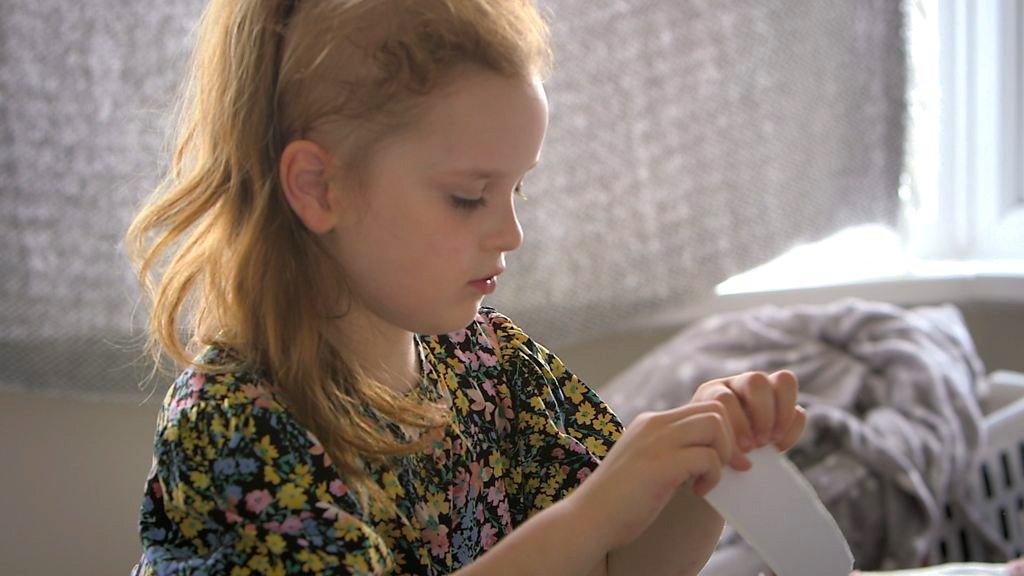SEND family spends £20k fighting for school place
- Published

Gemma Carlier spent almost £20,000 to secure a place at a special school for her son who has autism
Parents of children with special educational needs and disabilities (SEND) say they are struggling to secure suitable school places for them.
Anna Geldard spent £20,000 fighting for the Education, Health and Social Care Plan (EHCP) her child is entitled to.
She said it was "so stressful" and the emotional impact was far greater than even the financial cost to her family.
The government said the SEND system was under review and it had also increased SEND funding to £8bn in 2021-22.
An EHCP is a legal document that sets out the child's needs in these areas and the support they require.
Some families struggle to obtain an EHCP however and feel intimidated by the "adversarial" and detailed legal process involved, parent-led campaigners Send Crisis group said.
"You're literally having to fight people to get what you know your child is actually legally entitled to," Anna, from Somerset, said.
Her daughter is autistic with developmental language disorder and specific learning difficulties in writing and spelling that Anna describes as a form of dyslexia.
She began struggling to fit into mainstream education as she progressed through primary school and matters came to a head in Year 5.
"She started to refuse to go to school so she would literally physically hide," said Anna.
"When I spoke to school about it and I said, 'could she please be assessed by an educational psychologist because she's a lovely girl, she's a compliant girl, this is not naughty behaviour, this is something really wrong'.
"They said they couldn't justify it because they only have a budget for two hours or something for an educational psychologist."

Anna Geldard's family spent £20,000 challenging the local authority's decision to send her daughter to a mainstream school
Her daughter stopped attending classes in December 2019 when she was due to begin secondary school.
In the end she missed a whole year, although this was partly due to waiting for a place at her chosen special school.
The process was further complicated because after the EHCP had been obtained, Somerset County Council's educational psychologist recommended a mainstream school for her, a decision that Anna's family appealed against at tribunal.
She said that she did not find it easy to raise the funds to fight the council psychologist's recommendation.
"We had family to help us but how many people can do that really? Not everyone could."
A spokesperson from Somerset County Council said it was "working hard and investing heavily" in the area.
"While we cannot comment on individual cases, we can say every young person is different and their needs will be different," the spokesperson said.
"Decisions about education health and care plans are made by an expert panel in discussion with parents/carers, and ensuring the best life chances and educational outcomes is at the heart of all our decision-making."

The system for applying for EHCP feels very adversarial, parent Emily Carr from Kent said
Anna's frustration is shared by many other parents who feel they are "fighting a system" where local authorities are unwilling to pay for EHCP assessments and place a child in a special school.
Emily Carr, from Kent, said: "My son has a diagnosis of autism and he really struggled in mainstream, he was overwhelmed by the size and the demands and the noise."
She said while he was academically able he found the school environment difficult to cope with in terms of sensory processing. Some days he would "curl up into a ball" because of the stress.
As a result her family de-registered him from school and paid privately for him to complete his GCSEs online.
In total they spent about £10,000 on private tuition, on top of the legal costs of securing an EHCP.
It was only when they were eventually referred to Child and Adolescent Mental Health Services (CAMHS), which in turn recommended an EHCP, that they secured one.
Having obtained it, Emily too had to appeal against the local authority's recommendation of sending him to another mainstream school.
She said she employed professional help because she "didn't feel confident" making the appeal by herself, given the "detailed legal procedure" involved and how emotionally invested she was in the outcome.
Her son is now "doing fabulously well" at a special school in further education.
"The whole system really needs quite a serious overhaul it feels very, very adversarial with the local authorities.
"They're looking for every reason possible to meet that legal requirement at the minimum possible costs they can get away with.
"I don't blame them, I recognise that it comes from finance."
Kent County Council's director for Special Educational Needs and Disabilities, Mark Walker, said: "Kent County Council carried out an Education and Health Care (EHC) needs assessment at this family's request and a final Education Health and Care Plan (EHCP) was issued in February 2019.
"The plan named a mainstream school as this was deemed to be most appropriate for the child's needs.
"The family exercised their right to appeal this element of the plan at a First-tier Tribunal.
"The case did not progress to a hearing, with KCC agreeing to name the particular special school the parent had requested."
The council also said that if a student had registered for home-schooling the family was responsible for all educational provision, including financial costs.

The government says it has invested £8bn in special needs education
It is a brick wall other parents have contacted the BBC about; EHCP statements failing to be carried out within a 20-week time limit or schools and local authorities turning down requests to assess a child.
Gemma Carlier, who now lives in Suffolk, said her family spent about £18,500 to get an EHCP in place for her autistic son who is now 14. She said at the time the amount was "financially crippling".
She lived in Essex when her son began struggling at school and she challenged Essex County Council's decision not to assess her son for an EHCP.
"He had to go into crisis before anything happened," she said.
"The difficulty as a parent is that you have that dilemma of whether you remove your child, because you see the damage that it's doing, or you keep your child there because you need evidence to prove that they need support."
She said at one point he was being sent home and effectively excluded every day because he was "stressed and anxious he couldn't go into a classroom".
She said she was then labelled as a "vexatious parent" for challenging the school.
"People talk about inclusion as if it's a really healthy thing," Gemma said.
"But what inclusion means is trying to make children who struggle to fit in, fit in.
"It doesn't necessarily mean providing what they need," she said.
A spokesperson for the council said: "Essex County Council is committed to ensuring that every child in the county has the support they need to meet their educational potential, and that they receive all the necessary support and resources to meet any special educational needs or disabilities."

Parents are remortgaging, selling their cars and even wedding rings to afford the legal fees to secure special school places
A spokesperson for Send Crisis group said: "Although legal representation isn't necessary at tribunals, families are often faced with local authority solicitors and barristers funded at public expense.
"It's an extremely stressful and unfair process and some families understandably feel they have little choice but to employ their own solicitor.
"We've heard from parents who have remortgaged homes, sold family cars and even a wedding ring.
"Those that can't raise the money for legal fees face inequality of representation.
"Even so, 95% of tribunal decisions are in favour of families."
The government spokesperson said it had increased its high needs funding by nearly a quarter to £8bn in 2021-22 and the "vast majority" of cases concluded without the need for a tribunal hearing.
He added: "But we recognise that there remain some inconsistencies in the support provided around the country, which is why our SEND Review will look to ensure the SEND system is consistent, high quality, and integrated across education, health and care."

Follow BBC West on Facebook, external, Twitter, external and Instagram, external. Send your story ideas to: bristol@bbc.co.uk , external
Related topics
- Published7 January 2021

- Published7 September 2020
